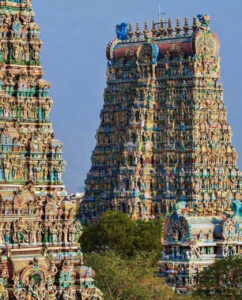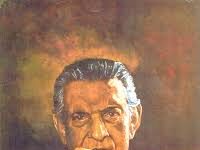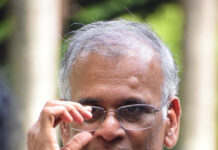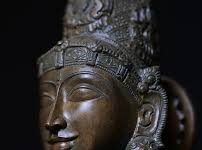
Dear Je,
I am confused by the recent discussions. Although I wanted to ask you about it, I kept having a difference of opinion with your thoughts and ideas. Your political ideologies are not agreeable to me. I’m writing now as this confusion persists.
Here is my question. Is there such a thing as ‘Hindu Religion?’ The word ‘Hinduism’ was used by Muslims and defined by Britishers. So, people say there is nothing called Hinduism. What is your explanation for this?
I am a person with a Hindu belief system. I was an atheist once; after my father’s demise and the subsequent events, I crossed over the crisis only because of my faith in Hinduism. Lord Muruga saved my life and was beside me. I pray to Lord Perumal as well. Will it be fit to call myself a Hindu?
Ravikumar Perumal
Dear Ravikumar,
During the height of this debate, I got hundreds of questions such as this. I avoided voicing my opinions at that time. It was not primarily about religion or spirituality but was political. It was rife with prejudices and vengeance. All the religious stances were being belittled, mocked, and erroneously lashed in the debate. I had no desire to be a part of it.
During my speech at Pondicherry, I pointed out a significant trend in thought. Worldwide, Hindus have a unique mindset. It has persisted among us since the British era and is at its peak in Tamil Nadu. Hindus are the only ones who get their religious knowledge and learnings from people who openly proclaim themselves as enemies of Hindus and from people who declare that they toil hard to destroy Hinduism. They are unaware of the scholars and the wise who spoke and wrote extensively about Hinduism.
To understand Hinduism, in Tamil, there are several works written by scholars from A. L. Natarajan to Kannadasan. A variety of books and texts authored by sages from Swami Chidbhavananda to Swami Asutoshananda are also there. My books on these subjects are available, and many of my articles are available for free on the internet. No one refers to any of these in the heated debates. They are not used as evidence against false attacks and twisted facts. Alternatively, only what is said in public by the politicians is taken into consideration. That is the real problem. It is the ignorance and carelessness on the part of the Hindus.
Even this article will likely reach about ten thousand readers. Many of the readers who visit my website will not read this. On the other hand, if anyone shares a thoughtless video on YouTube, it will instantly garner five lakh viewers. People will question their religious faith and doubt their ancestors, but none will be ready to take the initiative to find relevant answers.
Also, a person like me, keenly interested in research and reading, can’t make up and tweak answers like the politicians and can’t talk down with false satire to questions like this. I would only be able to speak with a historical view and an understanding of the functioning of religions. That reply will be a hard nut to crack for many of us.
That is, People who vehemently deny the existence of Hinduism will not be able to comprehend the detailed historical explanation that proves otherwise. They mock the writer for writing lengthy essays but never turn back to read them and continue to yell.
However, I fervently believe that someday the young generation will heed these matters. When I began speaking up on these topics under the guidance of my Guru, not even five hundred people paid attention. I decided to voice these as a duty, even with no takers. Let the answers be here and be available to those in need.
Fundamentals of a Religion
Any discussion or debate on religion should be grounded on certain basic concepts. The current discussion takes place without any such understanding.
- a) The beginning of religions was not institutionalized. It was not founded by christening a name and defining rules. But began somehow and grew with time. Their names and identities transitioned from period to period. Their evolution is a complex historical event.
- b) The concept of ‘Religion’ we understand now did not hold the same meaning in the past. All the religions of today did not claim themselves to be religions earlier. They called themselves ‘The Methodists (Vazhimurai) or The Way (Margam)’, ‘The Virtue (Aram) or The Dharma’, and ‘The Order or Sampradaya’. Islam was known as ‘The Way’, Christianity as ‘The Order’, and Hindus, Jains, and Buddhists called themselves as ‘The Dharma’. The concept of ‘Religion’ as we denote today, was defined by the European philosophers of the 16th century.
The word ‘Madham’ (Religion)
The Sanskrit word ‘Madham’ widely takes the meaning of ‘strong sect’. In Malayalam, Kannada & Telugu, I can say this sentence: “My religion is Parota is the best food”. We can hear similar slogans in political debates. A comparable word to ‘Madham‘ in Tamil is ‘Samayam’, which indicates ‘strong faith’.
As a doctrine or a school of thought, various religions have contributed to the basis of Indian philosophy. The Six Darshanas – Sankhya, Yoga, Nyaya, Vaiseshika, Poorva Mimamsa & Uthar Mimamsa—were mentioned as religions in the old texts. Additionally, many other religions, such as Thargiga, Charvaka, and Ekanam are cited. All these did not function similarly to what we define as a’religion’ today. That is, they did not have their deities, unique rituals, and institutions but remained only as philosophical principles.
People who considered ‘The Vedas’ as the canon belonged to the Vaidhika sect. Within that, a sect of people who viewed Vedas as just rituals distinguished themselves as the Mimamsa sect. And those who considered Vedas as a source of ‘The Knowledge’ fit into the Vedanta sect.
Even within the Mimamsa sect, Vedic religions split into many. Aindhiram idolized Indra, Varunam worshipped Varuna, Soura had Surya as the presiding deity, and Agneyam centralized Agni or Fire worship. (Poet Bharati mentions these as the six sects of the Hinduism)
These six sects have clearly defined rituals and traditions. All of these have a universal vision, a presiding deity, and their respective customs and rites. Shaivism venerates Siva as the Almighty, Vaishnavism has Vishnu as the Principal God, Shaktism prioritizes Shakti worship, Kaumaram has Murugan as the central deity and Ganapatya worships Ganapathy/ Vinayagar. All these have umpteen sub-sects within them.
Shaivites know and confirm that there are a lot of factions within Shaivism, like Agasamayam and Purasamayam. These differences are philosophical. Six Agasamayams are – include Padanavaadha Saivam, Bhedhavaadha Saivam, Sivasamvaadha Saivam, Sivasankranthavaadha Saivam, Isura Avikaaravaadha Saivam, and Siva Advaita Saivam. Six Purasamayams are – Kapalika, Pashupata, Maaviradha, Kalamukha, Vaamam, and Vairavam. Shaivism calls Jainism, Buddhism, and Vedanta as Purapura Samayam. (In many recent works, these classifications are flawed) All these are called ‘Madham’ or the Religion.
Even within Shaivism, there is Kashmir Shaivism, Veerashaiva, and Siddanta Shaivism (Meykandar Tradition), which are considered as distinct religions. Apart from these, Ganapatya, Kaumaram, and Shaktism have merged with Shaivism and remain an integral part of the worship.
Vaishnavism has managed to remain as four main sects in the past six hundred years. These are called Sampradaya or the Order. However, in ancient texts, they were mentioned as religions. Shri Sampradaya (the Sect of Ramanuja), Maadhav Sampradaya (the Sect of Madhva), Rudra Sampradaya or Pushtimarg (the Sect of Vallaba), Kumara Sampradaya ( the Sect of Nimbarka). Today, all these sects function independently of each other. Among the six religions, Saura (sun worship) merged with Vaishnavism.
Not only Hinduism, Buddhism, and Jainism are aggregates of their sub-groups. All religious sects within Hinduism like Shaivism and Vaishnavism comprise other religious factions. They differ and unite based on principles and belief systems. Often, these are done by Religious Saints. This is a common feature amongst all religions.
If we mechanically impose our recently defined methodologies of religion onto yesterday’s history, we will only gain a skewed understanding. If we can argue that there is no such thing as Hinduism, then we can conclude that there is nothing called Shaivism. We can continue dismissing the rest.
The term ‘Religion’ used in ancient times differs from what is considered ‘Religion’ in modern times following the European invasion. The concept of ‘Religion’, as defined by Europeans, is a modern construct. In the modern era, they amalgamated all the sects and factions traditionally referred to as religions into one unified category. This amalgamated group of sects came to be known as ‘Religion’ and was identified as the Hindu Religion.
Two Types of Religion
Not only Hinduism but any religion, for that matter, was not built on a single historical event or period. The evolution of religions has been researched extensively.
Firstly, religions can be divided into two – those that evolved naturally and those that were founded by prophets or saints. For ease of understanding, we can name them Natural Religions and Prophetic Religions.
There are a lot of Prophetic Religions. Jainism (founded by Mahavir), Buddhism (by Gautam Buddha), Ājīvika (by Makkhali Gosāla), and Sikhism (by Guru Nanak) are the Indian Prophetic Religions. Islam (by Mohammad Nabi), Christianity (by Jesus Christ), Confucianism (by Confucius), and Tao (by Laozi) are the other well-known Prophetic Religions.
Many Prophetic Religions have existed and disappeared. Some have not grown as prominent religions that we know today. ‘Manichaeism’ founded by Parthian prince Mani in the 3rd century, had a strong beginning but vanished completely under Islamic rule.
The Prophetic Religions continue to emerge to this day. ‘Baha’I’ religion founded by the prophet Baha’u’llah in Iraq in 1863, is spread all over the world. The ‘Ahmadiyya’ religion was founded in India in 1889 by a prophet named Mirza Ghulam Ahmad. These have their roots in Islam. Prophetic Religions that arose from Christianity are also present worldwide.
These Prophetic Religions originate from a Prophet. He claims to be the last one in the tradition of Saints or Prophets who came before him. For instance, Mahavir mentions 23 Tirthankaras who lived before him. Jesus and Mohammad said similar things.
Natural Religions are those which have evolved in the course of history without being introduced by a particular prophet. Hinduism is one such example. Bon Religion (in Tibet), Judaism, and Shinto (in Japan) are some of the examples. Many such Natural Religions are no longer alive today. Natural Religions like the Ancient Greek religion in Europe laid the foundation for world thought. They all have disappeared.
Worldwide, the Natural Religions are brutally attacked and destroyed. Most are extinct now. And very few remain. Bon religion and Shinto exist only as names. Judaism persists only in factions. Hinduism remains the largest surviving Natural Religion in the world today.
(Continued)












